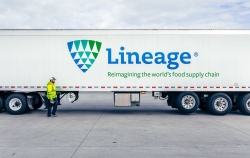Leading with Purpose: Caitlin Voegele on Women's Empowerment at Lineage
March 06, 2024
In celebration of Women's History Month, we spoke with Caitlin Voegele, Lineage's Director of Data Science Strategy and chair of the Women in Lineage (WIL) Employee Resource Group (ERG), about the importance of Women’s History Month. Caitlin shares insights on personal inspirations, Lineage's diversity initiatives and the Women in Lineage (WIL) Employee Resource Group's efforts to elevate and amplify women's roles and achievements in the global food supply chain. Her reflections offer a snapshot of the significance of Women's History Month in driving cultural change and gender equality across every industry.
In what ways do you believe celebrating Women's History Month can inspire changes in workplace culture towards greater equality and inclusion?
Women’s History Month was established to increase awareness of women’s contributions to society. At Lineage, this is an opportunity to recognize the incredible women who drive the global food supply chain. It’s a time we can inspire changes in the workplace by highlighting achievements, educating about challenges, fostering dialogue, encouraging cultural shifts and promoting allyship.
Women’s History Month is not just for women; it’s an opportunity for all of us to reflect on our role in advancing gender equality.
Reflecting on the diverse achievements of women throughout history, can you share a personal story of a woman (historical or contemporary) who has influenced your professional or personal growth?
Professionally, I often revisit leadership lessons from Michelle Obama and Jacinda Ardern, the former Prime Minister of New Zealand. Both emphasize the significance of leading with empathy and authenticity.
From a personal standpoint, my father is my primary influence. Yes, this is about Women’s History Month, but as Natalie Matsler, Lineage’s Chief Legal Officer, reminded a room full of WIL members at our ERG summit, it’s also important to support the men who support women.
My father raised three daughters. Even though my sisters and I have pursued very different career paths, we all consider him our number one supporter. He spent his entire career in logistics, which gives me a unique opportunity to bond with him over industry news and shared professional experiences. Early in my career, I called him the night before a big interview I was nervous about. He told me “If it’s good, great. If it’s bad, it’s experience.” I carry that motto with me to every new professional challenge I face.
Since initiating a stronger focus on diversity and inclusion, can you highlight any specific actions or programs Lineage has implemented to advance gender equality within the workplace?
We have six active and engaged Employee Resource Groups, led by dedicated individuals. These leaders are committed not only to their specific group, but also to the broader diversity, equity and inclusion efforts at Lineage. We approach this important work as a team, sharing best practices and collaborating on impactful initiatives.
I’m also excited about the growing education and language on fostering inclusive behaviors at Lineage. Inclusion is the practice of leveraging the power of our differences and similarities. This practice will significantly influence our ability to effectively achieve our vision of transforming the food supply chain to eliminate waste and help feed the world.
Looking forward, what innovative strategies or initiatives do you envision for the WIL ERG to enhance the visibility and impact of women's contributions at Lineage?
There is so much we aim to accomplish with WIL! Our strategic focus this year is twofold; first, to deepen our reach in the field; second, to solidify our brand internationally. In December, we launched our first international WIL chapter in Europe, with plans to establish our next chapter in the Asia Pacific region.
We've also introduced new roles to our leadership team to strengthen our connection with operations team members across the Lineage network. Our three inaugural Field Liaisons are extraordinary women with inspiring career paths and unique viewpoints. The goal is to ensure our programming is aligned with the needs of the women of Lineage at all levels.
Lastly, we’ve received feedback from our members about highlighting the diversity of women within Lineage. This year, our International Women’s Day panel was organized to acknowledge the diverse experiences of women, including those from different racial, ethnic and cultural backgrounds. We have an important responsibility to uplift the voices of marginalized groups and ensure our diversity and inclusion efforts are both inclusive and intersectional.
How can organizations effectively mentor and promote women into leadership roles, ensuring a balanced representation across all levels of decision-making?
By reevaluating the outdated definition of what it means to be a good leader!
My first job out of college was an Operations Leader in a distribution center where I was responsible for warehouse team members many years my senior and nearly all male. After I started, I learned I had almost been passed over for the job because one interviewer thought I wouldn’t be “tough enough”. My eventual success in that role solidified my opinion that leadership isn’t about fitting the stereotypical, narrow definition of “tough” or about being the loudest in the room. It’s about being empathetic, kind, understanding your business, making decisions, identifying strengths in your team, empowering people and so much more. These are qualities I’ve seen in the best leaders at Lineage, many of whom are women.
Beyond the annual celebration of Women's History Month, what continuous efforts can be made by organizations to educate and engage team members in understanding the significance of women's roles and contributions?
From a tactical perspective, consider our continuous improvement framework - plan, do, check, act. Identify the gaps in our current state, set targets to address the root cause and then evaluate results, always looking to get better than we were yesterday.
On a more strategic level, gender equality is a substantial, significant and sometimes daunting goal. I like to remind myself that we aren’t individually responsible for changing the world’s attitude towards women. Progress may not be linear, but it’s also not guaranteed or inevitable. Whether you’re a woman or an ally, we all have to take responsibility for pushing equality forward.
Forward Together: Amplifying Women’s Voices Year-Round
As we reflect on Women’s History Month, it's evident that this is more than just a check-the-box celebration at Lineage; it's a catalyst for ongoing conversations and change. Caitlin's insights reveal a deep commitment to improving gender equality by learning from and celebrating personal inspirations and developing organizational initiatives that support and elevate women within the workplace. The expansion of the Women in Lineage ERG and a focus on building a leadership team that more accurately reflects the world we live in help pave the way for a more equitable future. This conversation underscores the importance of recognizing and amplifying women's contributions, not just in March, but throughout the year, as a vital step towards fostering a culture of diversity, equity and inclusion.


